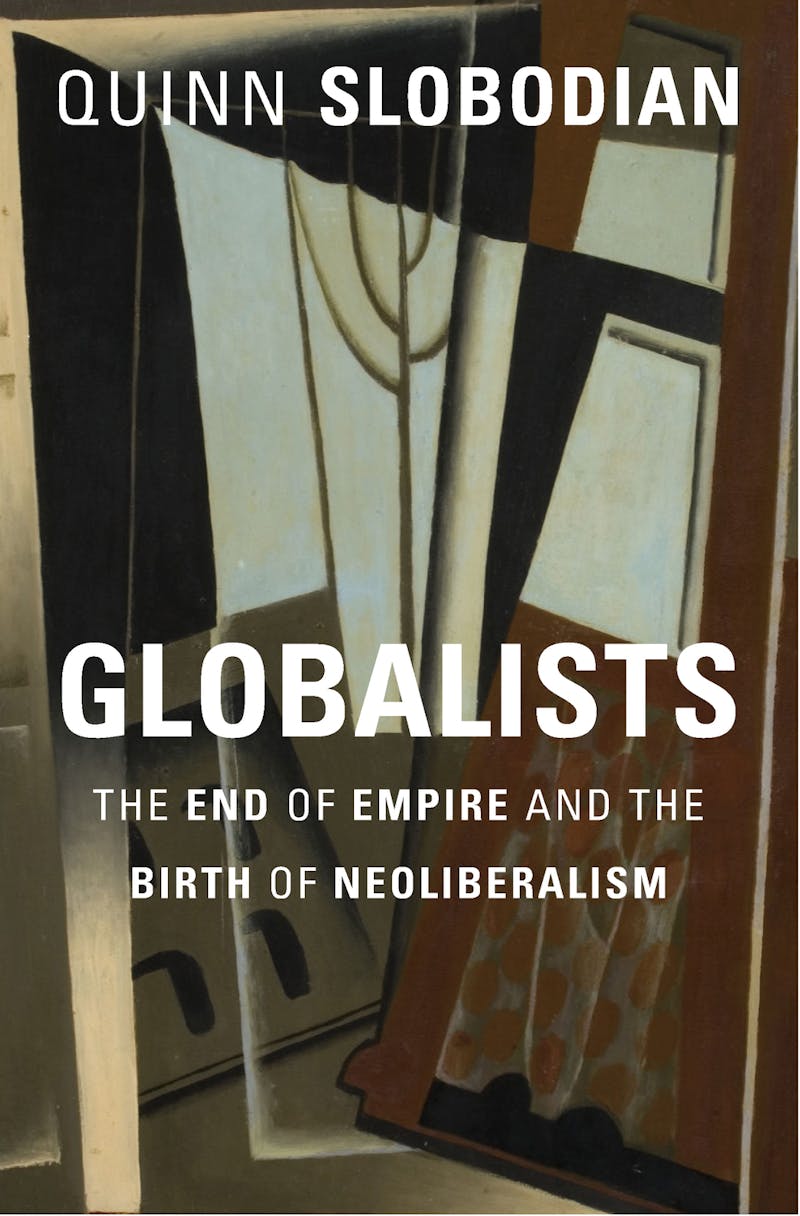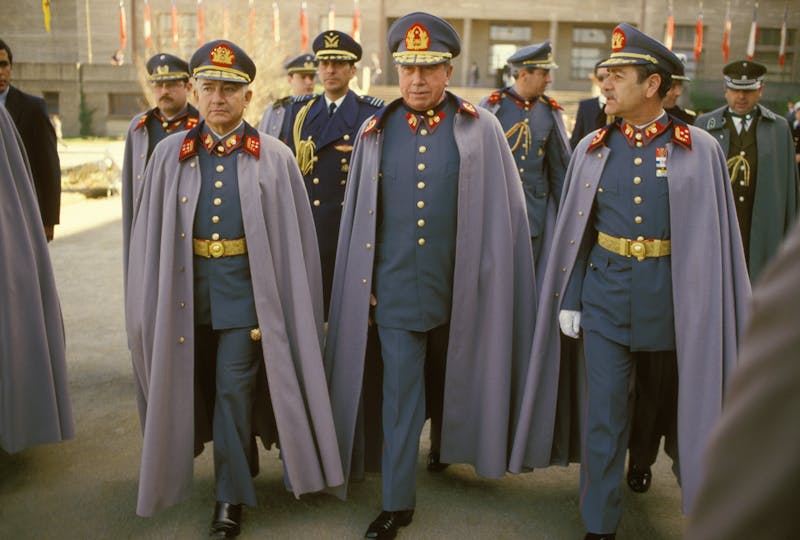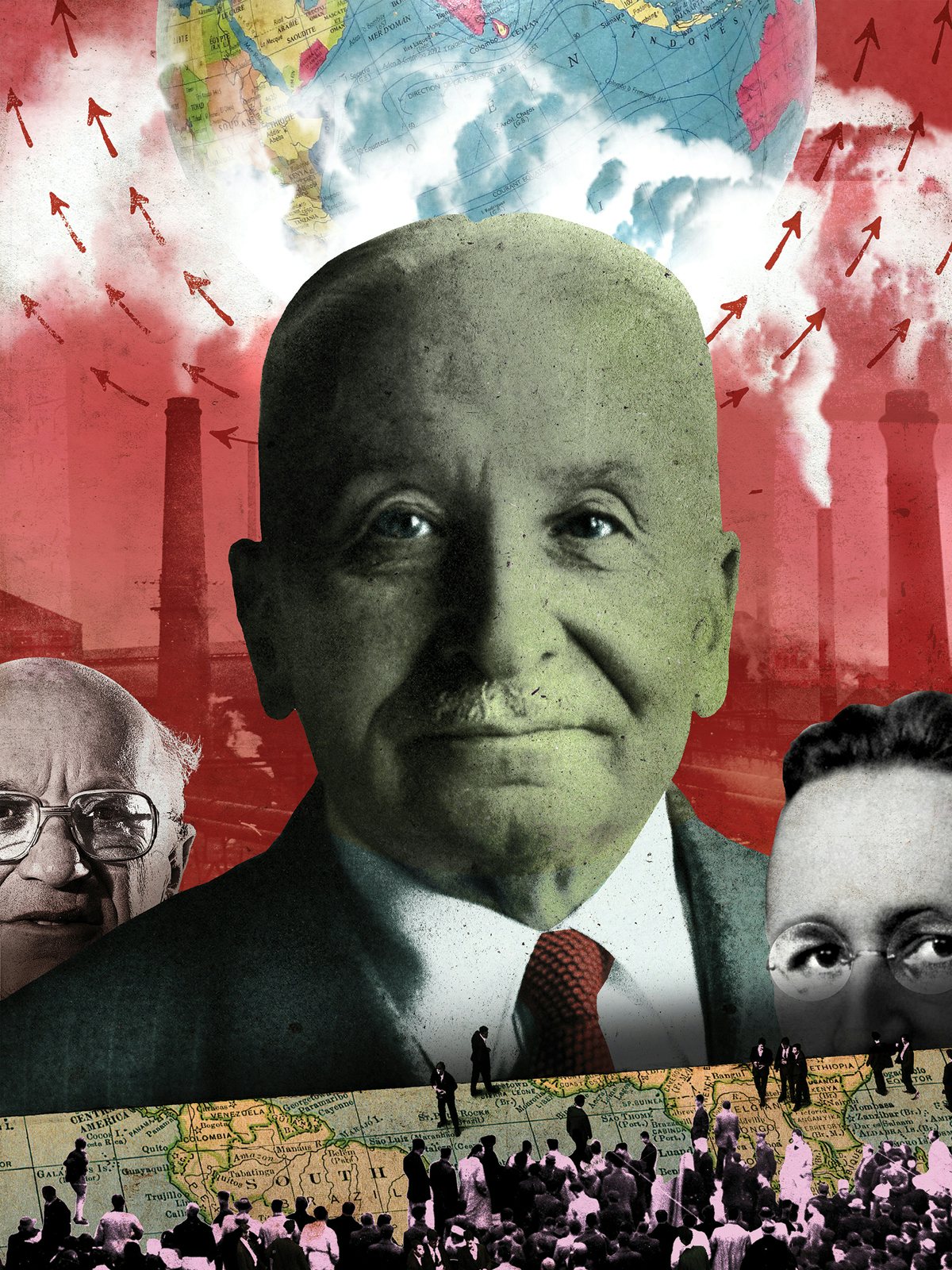It is difficult to consider the state of the world in 2018 and not feel a sense of vertigo. Humanity has greater capacity for production than it has ever had before, and simultaneously, the ability to destroy the world many times over. The products we rely on—whether for food, fuel, communication—are woven together in supply chains that have the complexity of medieval tapestries. Some people can make unimaginable fortunes in microseconds, while others still scratch a living out of the dry ground. Eight men, it is calculated, hold as much wealth as the poorest half of the planet: 3.6 billion people. A global system underlies this vastly unequal distribution of wealth and power. But what to call this system? What is its name?
It is not enough to call it capitalism, since capitalism has been around for hundreds of years and transforms itself with great dexterity. The term “late capitalism” acknowledges that, but it presumes something about the future that we cannot know. What can be identified is a shift, usually dated to the 1970s, when rich countries moved away from a regulated economy of mass production and mass consumption, organized within nation states. David Harvey, writing in 1990, saw it being replaced with “post-Fordism”: an economy built on just-in-time production, the internationalization of capital, the deregulation of industry, insecure labor, and the entrepreneurial self. In the years since, these trends have only accelerated due to improvements in, and the spread of, information technologies. But few call this “post-Fordism” any longer. They mostly call it “neoliberalism.”

Even to say this word is to invite controversy. Jonathan Chait has expressed a common point of view when he has argued that neoliberalism is little more than a slur used by writers on the left to label varieties of liberalism they dislike. For the left, neoliberalism often connotes a form of liberal politics that has embraced market-based solutions to social problems: the exchanges of the Affordable Care Act, for instance, rather than a single-payer, universal program like Medicare. Chait argues that leftists use the word to “bracket the center-left together with the right” and so present socialism as the only real alternative. But the term has its critics on the left, too: Political economist Bill Dunn finds it too insular, rarely adopted by the people it is said to describe. The historian Daniel Rodgers, meanwhile, argues that neoliberal means too many different things, and therefore not enough.
And yet, the world today works in a distinctive and relatively new way, and those workings need a name. Its critics are right that neoliberalism has multiple meanings and can be used in a way that is more pejorative than precise. But it also has an intellectual genealogy with real bearing on our time, making a careful reconstruction of its history essential to understanding our global economy. Quinn Slobodian provides exactly that in Globalists, showing how neoliberal ideas grew from particular historical circumstances to global influence, while also correcting certain misconceptions about neoliberalism’s meaning and goals.
Neoliberal ideas emerged from the ruins of the Austro-Hungarian Empire in the early twentieth century. While the empire had been growing quickly into an industrial power, it lagged behind Germany, France, and Britain. Then World War I disrupted the economy and broke the imperial system. With the end of the war, Austria became a democratic republic, and socialist candidates won repeated victories in its cosmopolitan capital, Vienna. From 1918 to 1934, “Red” Vienna became a model city for democratic socialism, with social housing and expanded schooling for children and adults, all protected by a militant labor movement. The city inspired one resident, Karl Polanyi, to a lifelong defense of social democracy. Red Vienna, he wrote, caused “a moral and intellectual rise in the condition of a highly developed industrial working class,” which “achieved a level never reached before by the masses of the people in any industrial society.”
But not everyone saw it the same way. The war had reduced international trade and led to widespread interference by states in private property regimes, when governments had confiscated foreign-owned property and commandeered resources. Ludwig von Mises, an economist in the Vienna Chamber of Commerce, wanted to restore free trade and the sanctity of property. The prewar version of the Austro-Hungarian empire became a point of reference for Mises and those who joined the study circle he organized: It had been a multi-ethnic empire that lowered barriers to trade while not insisting on cultural homogeneity. A relatively small, landlocked place like Austria, they reasoned, could never be economically self-sufficient in the industrial age. It had to be open to the world market, and to succeed there it would have to be competitive.
The labor movement, then, was a further obstacle to the realization of Mises’s project. The same forces that inspired Polanyi, Mises found oppressive. Labor unions marched in the streets, demanding higher-than-market wages and lower-than-market housing. The city kept budgets balanced with high and progressive taxes, and businesses fared about as well as elsewhere in Austria. But social housing undermined the position of landlords, and the bourgeoisie felt targeted by taxes on conspicuous consumption. For a time, there was even a dog tax that scaled upward with the breed and pedigree of the dog. Mises saw Red Vienna as a standoff between the power of labor and the power of capital. He was pleased when an anti-fascist uprising was violently suppressed in 1927—leaving dozens dead and more than a thousand injured—since it broke the power of the social democratic masses to mobilize.
Democracy, for Mises, was not an absolute value to be respected at all times. It was a good system insofar as it made peaceful, gradual change possible. Democracy’s “function is to make peace,” he wrote, “to avoid violent revolutions.” When it failed in that task, Mises thought that enforcing order by other means was preferable to letting democracy destroy the economic foundations of prosperity, as he understood them. Although it is frequently said that neoliberals want a weak state, in which the market can be left to do most of the work, that is not quite correct. Against the enemies of the market—economic nationalism and democratic demands—the state has to play a role, mostly by creating a system of laws that protects property and by representing enough force to deter challenges.
The neoliberals sought, Slobodian writes, to “encase” markets, not to liberate them. Their project was not anarchy: It was a global system that sufficiently ordered the world so that capitalism would be safe from certain forms of political interference. Friedrich Hayek, who had worked under Mises, imagined an organization independent of any one country that would set the rules of the market. Hayek envisioned separate cultural and economic governments: The former would satisfy the demand for mass participation, while the latter would make sure that democratic enthusiasms did not interfere with the functioning of markets across the world. The neoliberal world, Slobodian writes, “is not a borderless market without states but a doubled world kept safe from mass demands for social justice and redistributive equality by the guardians of the economic constitution.” Neoliberalism places property, in other words, beyond the reach of democracy.
For most of the middle of the twentieth century, neoliberals thought they were losing, even as their organizing got more sophisticated. The term “neoliberal” was adopted at the Walter Lippmann Colloquium, held in Paris in 1938, with Mises and Hayek in attendance. In 1947, Hayek established the Mont Pelerin Society in Switzerland, making it the institutional home for neoliberal thought and debate. But the world seemed to be going in a social democratic direction. Demands for social justice found new forums for expression in the world after World War II. United Nations agencies, at least formally, granted nations equal sovereignty, and there were ever more of them in a decolonizing world. European countries built up welfare states, and the countries of the global South demanded consideration of their economic needs. The neoliberals were indignant.
It wasn’t that they favored colonialism, as such. They asserted, in fact, that capitalism was anti-imperialist. Their objection was that the language of rights and the consequences of decolonization threatened the market. As the German economist Wilhelm Röpke sarcastically said, “Today’s ‘human rights’ as formulated by the U.N. include the sacred right of a state to expropriate a power plant.” Many countries did indeed see nationalization as part of their economic sovereignty. In 1938, the Mexican government took control of the country’s oil to great popular acclaim, and in the 1952 U.N. General Assembly, Uruguay and Bolivia, too, proposed that peoples should be free to exploit their natural resources. Neoliberals wanted rules in place to prevent exactly this sort of scenario, establishing rights instead for the owners of capital.
Time and again, Slobodian sees popular demands for justice undercut by neoliberal ideas about how the world should be organized. In a fascinating chapter, Slobodian examines the various conflicts within the Mont Pelerin Society over the subject of apartheid South Africa. Some of its thinkers were explicitly racist, equating creditworthiness with “civilizational status.” But the typical neoliberal response was to reject racism, even to reject race as a category of analysis. Hayek himself called apartheid “both an injustice and an error.” The system interfered, after all, with the allocation of resources, by keeping black Africans from participating in free markets and preventing them from the most efficient application of their talents and labor. Yet granting black South Africans suffrage rights would inevitably lead to a reordering of property relations, since the black majority would favor reclaiming land that had been taken by white settlers. This was unacceptable in Hayek’s view.
Within the Mont Pelerin Society, the problem of how to end colonialism without destroying property rights was much debated. The English economist William Hutt imagined that voting power in postapartheid South Africa could be made proportional to economic weight. Milton Friedman agreed that one man, one vote would be terrible for South Africa, and Hayek worried that putting sanctions on South Africa would upset the global order. They didn’t favor apartheid, but they were against almost anything that might bring it to an end.
The story is a similar one in Chile. Hayek visited Chile under the Pinochet dictatorship twice and met with Pinochet once. During his second visit, Hayek told a Chilean newspaper that it was possible for a “dictator to govern in a liberal way,” and that he preferred a “liberal dictator to a democratic government lacking liberalism.” Given the widespread use of torture by Pinochet’s government, this has often been seen by critics of neoliberalism as a link between the intellectual architect of neoliberalism and authoritarian repression, while Hayek’s defenders have seen it as an aberration. In fact, it was simply consistent with the way that he saw the world: The socialism of Salvador Allende, whom Pinochet had overthrown, was democracy gone wrong. Restoring a market economy took priority over human rights and social justice. A dictatorship was not desirable, but he objected more to those who protested its abuses.
If neoliberal thinkers once appeared to be losing the battle for the postwar order, they have enjoyed many victories in recent decades. Here, Slobodian differs in illuminating ways from recent treatments of neoliberal ideas and action. Others have focused on different branches of what Philip Mirowski and Dieter Plehwe called, in The Road from Mont Pelerin, the neoliberal “thought collective.” Angus Burgin’s The Great Persuasion, for example, moves from Hayek to the Chicago branch associated with Milton Friedman, while Nancy MacLean’s Democracy in Chains profiles the Virginia branch centered around James McGill Buchanan. Both books show how deep-pocketed businessmen helped those ideas spread, connecting with Republican Party politics and gaining greater policy influence over time.
Slobodian focuses instead purely on the central European strand of neoliberalism—what he calls the “Geneva school”— which gained relevance through a different institutional path. Turning to the law, this school pursued bilateral trade agreements and international accords granting the power to enforce contracts, to keep trade open, and to prevent the seizure of property by states—mechanisms that could protect property from democracy and extend the power of capital. They influenced the structure of the European Economic Community of 1957, the renegotiation of the General Agreement on Tariffs and Trade during the 1970s, and the creation of the World Trade Organization in 1995. Slobodian’s argument relies less than MacLean’s on revealing a dark-money conspiracy and is more attuned to the shifting interests that created the trade regimes of a more neoliberal world.
The current rules all but ensure that governments act in the interests of capital, since, if businesses do not like a certain country’s policies (say, a proposal that corporations pay their fair share of taxes), they can disrupt the economy by abruptly withdrawing from that country. Preserving the rights of capital is the goal, even when that means sacrificing democratic demands. That is why our world is a more neoliberal one than it once was, and why it matters. However fractious and internally contradictory neoliberal thought may be, and however overused it can be as a term, it is describing something real.
It is the nature of ideologies to see some things clearly and place other things out of view—to serve up a combination of useful concepts and to conceal self-interest. Sets of ideas that become influential can usually do a great deal of the latter. The point is surely not that neoliberalism is wrong about everything: It makes sense to seek to avoid hyperinflation, for example, and it is reasonable to note that price fluctuations in market economies provide information to consumers and business owners about how to behave—if apples become scarce, and their price goes up, consumers can substitute, say, cheaper oranges. And it certainly is possible, too, for political decisions to mangle an economy so that markets cease to perform their socially useful work. Venezuela, where the economy contracted 13 percent last year, as people suffered through shortages of medicine and food, is perhaps the most tragic example at the present moment.

But the things that neoliberalism has trouble seeing are, at the present, far more consequential: deep inequalities, accompanied by a sense of powerlessness, of being left behind by a global system that operates with no regard for the interests or voice of the majority. Venezuela’s socialists wouldn’t have had their chance in power if not for the austerity imposed by neoliberal adjustment policies of the 1980s—policies that were met by popular protest that was suppressed by state violence. The rise of the far right in the United States and Europe cannot be explained solely as a reaction against neoliberal globalization (not least because many of its supporters are thriving economically), but the financial crisis of 2008—caused by inadequate regulation—did give the far right its opportunity to grow.
Furthermore, the primacy of capital in neoliberalism means that crises will be resolved on the backs of the poor, with cuts to the welfare state and public services, though it is not the poor who cause them. Even the International Monetary Fund, which demanded austerity as a response to debt crises in the 1980s, now acknowledges that some neoliberal ideas have been oversold, concluding that increased inequality hurts “the level and sustainability of growth.” Similarly, much of the economics profession has moved on from neoliberalism, recognizing that there are many ways to operate a healthy economy. Dani Rodrik points out that rich countries have public sectors ranging in size from 33 percent to nearly 60 percent of gross domestic product. A large state sector is not the antithesis of personal liberty: Indeed, it can sustain it.
What neoliberalism misses or ignores is that a world of apparently neutral rules is still a world of power inequalities. When capital has more freedom than people, serious democratic deficits are guaranteed. Voters may prefer a strong welfare state, but they may get austerity instead. In many nations, including the United States, the power of money in politics gives concentrated wealth a sword to hold over democracy’s neck. As the wealthy exert ever more influence over the political process, we may be closer to William Hutt’s plan for weighted voting than we would probably admit. In the neoliberal view, this is how it is supposed to work. It is, in Hayek’s language, the “discipline of freedom.” But it makes the goal of achieving relative equality through democracy very difficult.
Mises wrote in 1922: “Our whole civilization rests on the fact that men have always succeeded in beating off the attack of the re-distributors.” But if that were ever true, then it should be clear, nearly a century later, that ignoring the distribution of wealth in capitalist economies is not reasonable, politically viable, or even economically sound. Slobodian has shown that neoliberals have engaged in an ambitious project of worldmaking so that people would be subject to the rule of markets. But as both neoliberals and their critics know, markets are human-made institutions. What kind of world we want to build is still our choice.
